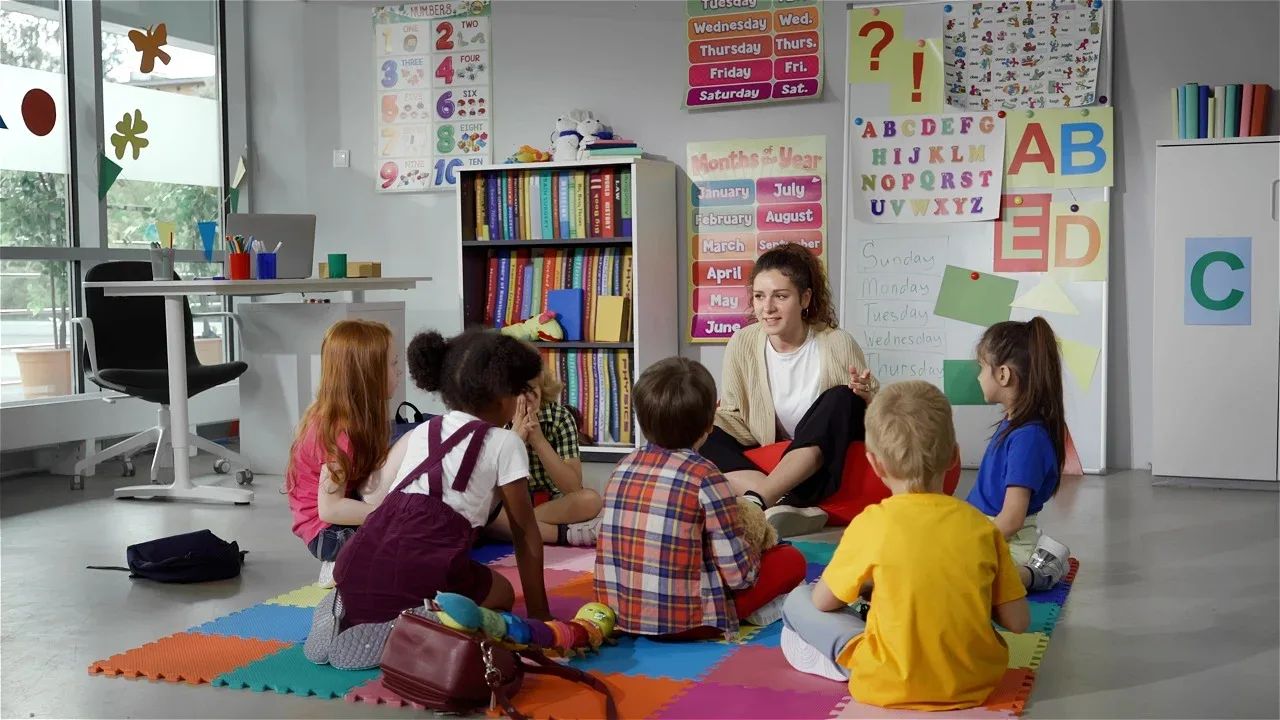Choosing a daycare centre is one of the most important decisions families in the United States make for their young children With so many child care options available, it’s essential to find a place that provides quality child care, values safety, and supports early development. Whether you’re exploring child care programs, preschools, or kindergarten readiness, here are 10 critical questions every parent should ask before enrolling their child in a trusted daycare centre.
A reputable daycare centre should also offer accessible child care resources, including transparency with inspections from an official government organization, listing on a gov website, and guidance on how to find child care that aligns with your family’s values. In addition, an experienced center director is crucial in upholding standards and ensuring the best outcomes for your child.
Throughout this article, you’ll find guidance not only on choosing a quality child care center but also on how to verify credentials, assess communication, understand scheduling, and explore child care services available near you. Let’s dive into the top 10 questions every family should ask when selecting the right daycare centre for their child.
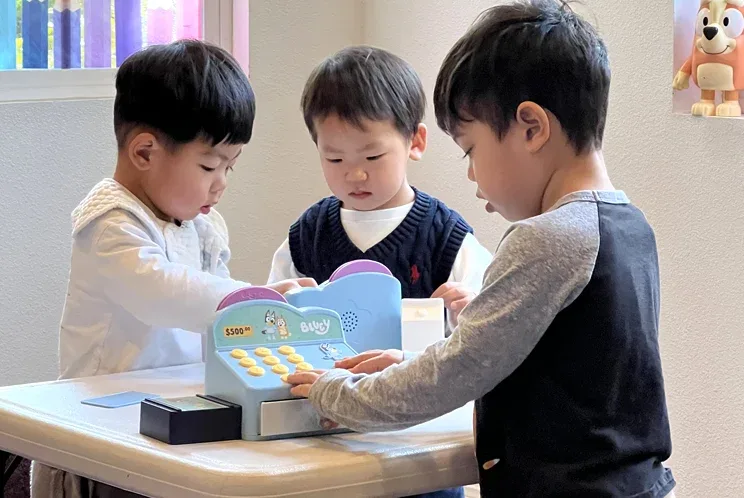
Contents
- 1 1. Are You a Licensed Child Care Center?
- 2 2. What Is the Staff-to-Child Ratio in Each Classroom?
- 3 3. What Does a Typical Day Look Like?
- 4 4. What Learning Philosophy Do You Follow?
- 5 5. How Do You Communicate With Parents?
- 6 6. What Safety and Health Protocols Are in Place?
- 7 7. How Do You Handle Nutrition and Allergies?
- 8 8. What Is Your Approach to Discipline and Emotional Development?
- 9 9. What Kinds of Physical Activities Are Offered?
- 10 10. What Do Current Families Say About Your Center?
- 11 Finding Child Care Resources in the United States
- 12 Ready to Visit a Daycare Centre That Prioritizes Your Child?
1. Are You a Licensed Child Care Center?
Ensuring the daycare centre is part of an official government organization is key. A licensed child care center follows state laws on staff training, facility safety, and curriculum standards. Licensing confirms the center meets or exceeds requirements around sanitation, teacher qualifications, emergency preparedness, and child protection policies. It also means regular inspections and compliance checks are conducted. Parents should ask to see proof of licensing and certifications from organizations such as NAEYC.
Q&A:
- Q: What agencies oversee your license?
A: In California, the Department of Social Services and the Community Care Licensing Division (CCLD) regulate and inspect child care facilities. - Q: Have you had any violations or compliance issues?
A: A reputable daycare centre will be transparent about its inspection history and willing to provide reports or direct you to the official CCLD database.
2. What Is the Staff-to-Child Ratio in Each Classroom?
High-quality child care services provide low student-to-teacher ratios to enhance safety, learning, and emotional development. Ratios vary by age group but are crucial in promoting individual attention, preventing accidents, and supporting behavioral management. In infant rooms, a 1:3 or 1:4 ratio ensures caregivers can meet frequent needs, while in preschool, a 1:8 ratio allows for guided group activities and support during transitions. Parents should inquire not only about the posted ratios but also how staff absences or sick days are covered.
Q&A:
- Q: What is your ratio for infants, toddlers, and preschoolers?
A: Infants typically require a 1:3 or 1:4 ratio, toddlers 1:4 to 1:6, and preschoolers 1:8 to 1:10 depending on state regulations. - Q: Are staff members trained in early education?
A: Yes, all lead teachers should have formal training in early childhood education, while assistants should undergo regular workshops and CPR certification.
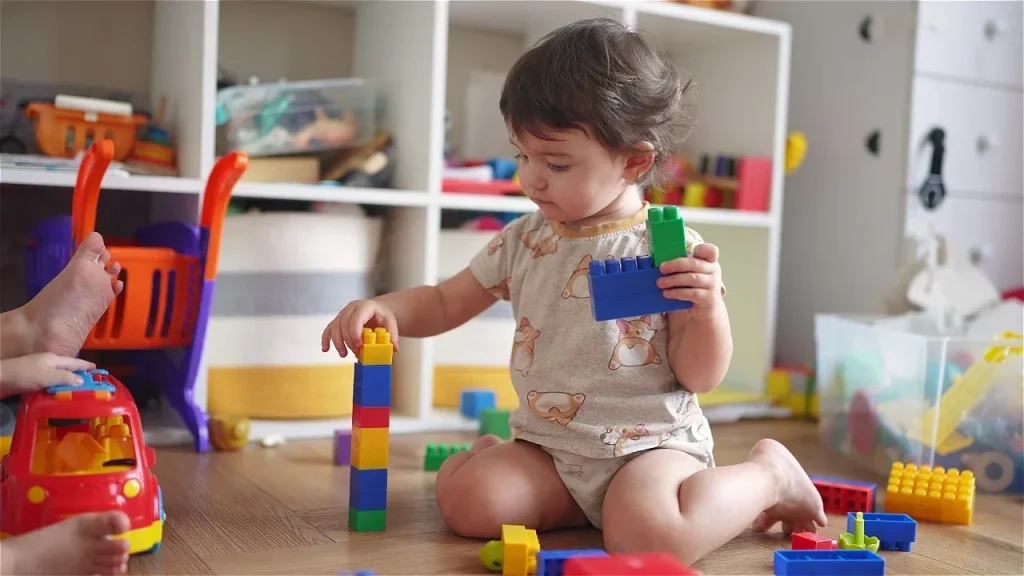
3. What Does a Typical Day Look Like?
A structured daily schedule in a child care program promotes consistency and comfort. A balanced routine provides cognitive stimulation, emotional security, and physical activity. Ask to see a printed schedule outlining circle time, reading sessions, outdoor play, meals, quiet time, and creative activities. A flexible approach ensures the daycare centre adapts to individual children’s needs and energy levels throughout the day. Parents should also ask how nap times are managed and what the policies are for feeding and bathroom breaks.
Q&A:
- Q: Can I review your daily schedule?
A: Yes, a sample schedule should be readily available and explain how time is divided between learning, meals, and free play. - Q: How do you support transitions between activities?
A: Teachers use songs, visual cues, and gentle reminders to prepare children emotionally and mentally for changing tasks.
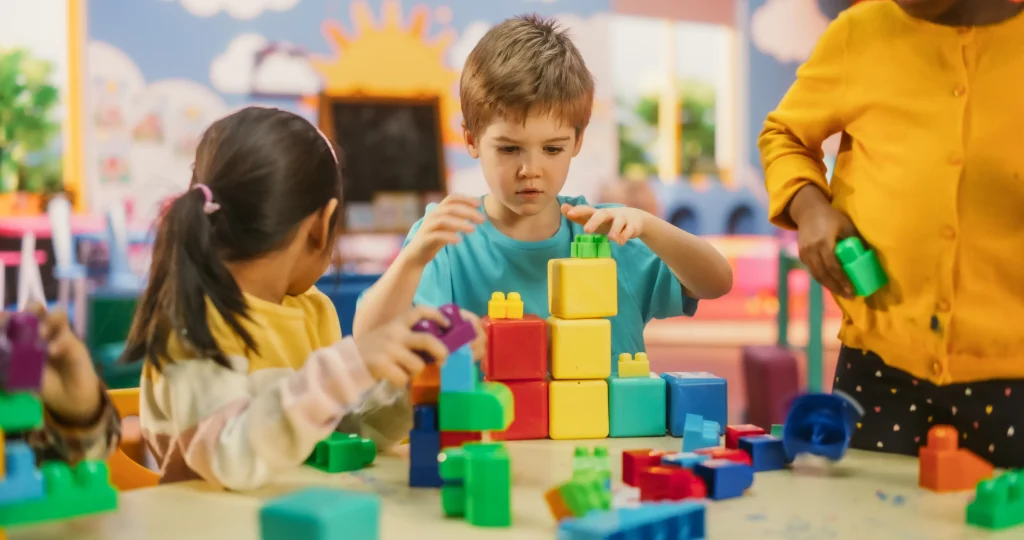
4. What Learning Philosophy Do You Follow?
Whether it’s Montessori, play-based, or a hybrid model, the daycare centre’s approach to learning should align with your values. Educational philosophy shapes how lessons are delivered, how children engage with materials, and what role teachers play. Some programs are child-led and exploratory, while others offer structured academics. Parents should look for a daycare centre that not only teaches letters and numbers but also fosters problem-solving, emotional intelligence, and creativity. A good center will evaluate children’s progress and share those findings regularly.
Q&A:
- Q: Is your curriculum inquiry-based or structured?
A: DeeCyDa combines both approaches, balancing hands-on play with foundational academics to support all learners. - Q: How do you support different learning styles?
A: By offering visual, auditory, and kinesthetic learning activities and rotating materials regularly to stimulate curiosity.
5. How Do You Communicate With Parents?
Transparent communication is a hallmark of a quality child care center. Regular updates via a mobile app, email, or printed reports allow parents to stay connected with their child’s experiences. Ask how the daycare centre handles emergencies, illness notifications, developmental concerns, and milestones. Parent-teacher conferences, family engagement events, and open-door policies promote trust. The ability to communicate concerns or feedback to staff easily ensures that the daycare centre partnership remains collaborative and supportive.
Q&A:
- Q: Do you use a parent portal, app, or in-person updates?
A: DeeCyDa uses a secure parent app that shares daily reports, photos, messages, and important announcements. - Q: How frequently are parent-teacher meetings held?
A: At least twice a year, with additional sessions available upon request to discuss developmental updates.
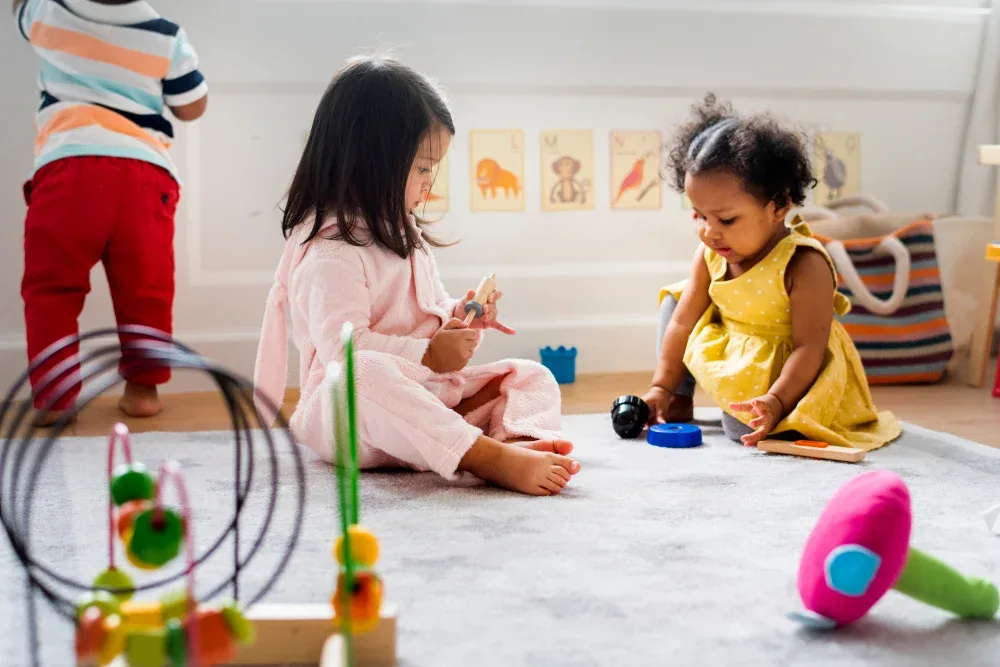
6. What Safety and Health Protocols Are in Place?
Ask about everything from secure entrances and emergency plans to staff certifications and management of sensitive information. A quality child care center has locked access points, visitor check-in systems, emergency drills, and protocols for illness management. Make sure cleaning routines are frequent, especially for shared items. Staff should be trained in child CPR and first aid. Centers should also have clear records management policies to protect sensitive information related to your child’s health and identity.
Q&A:
- Q: Are staff members CPR-certified?
A: Yes, every classroom has at least one adult certified in CPR and first aid at all times. - Q: What are your procedures for handling illness or emergencies?
A: Children with symptoms are separated, parents are contacted immediately, and classrooms are sanitized thoroughly. Emergency drills are held monthly.
7. How Do You Handle Nutrition and Allergies?
Meals should be nutritious and allergy-aware. Ask if the child care services accommodate dietary needs and whether food is prepared onsite. A good daycare centre offers balanced meals with protein, fruits, and vegetables, and limits sugar and processed foods. Allergy protocols should include staff training, labeling, and emergency response plans. Parents should also inquire about mealtime routines and whether children are encouraged to eat independently or with staff assistance.
Q&A:
- Q: Do you offer allergy-friendly meal options?
A: Yes, DeeCyDa provides gluten-free, dairy-free, and vegetarian meals and keeps allergy charts in each classroom. - Q: Can I send meals from home if needed?
A: Yes, in most cases. Please coordinate with staff to ensure storage and reheating protocols are followed.
8. What Is Your Approach to Discipline and Emotional Development?
Look for child care centers that foster emotional intelligence using guidance strategies—not punishment. Staff should model appropriate behavior, help children name emotions, and guide conflict resolution. Redirection, positive reinforcement, and calm-down spaces are often used in place of time-outs. Emotional development is crucial in preschool years and directly affects future academic and social success. Parents should ask how staff respond to aggressive behaviors and how emotional milestones are tracked.
Q&A:
- Q: Do you use positive behavior guidance?
A: Yes, we use evidence-based approaches like Conscious Discipline to foster social-emotional growth. - Q: How do you help children navigate social conflicts?
A: Through peer mediation, role-playing, and one-on-one support with teachers trained in early childhood psychology.
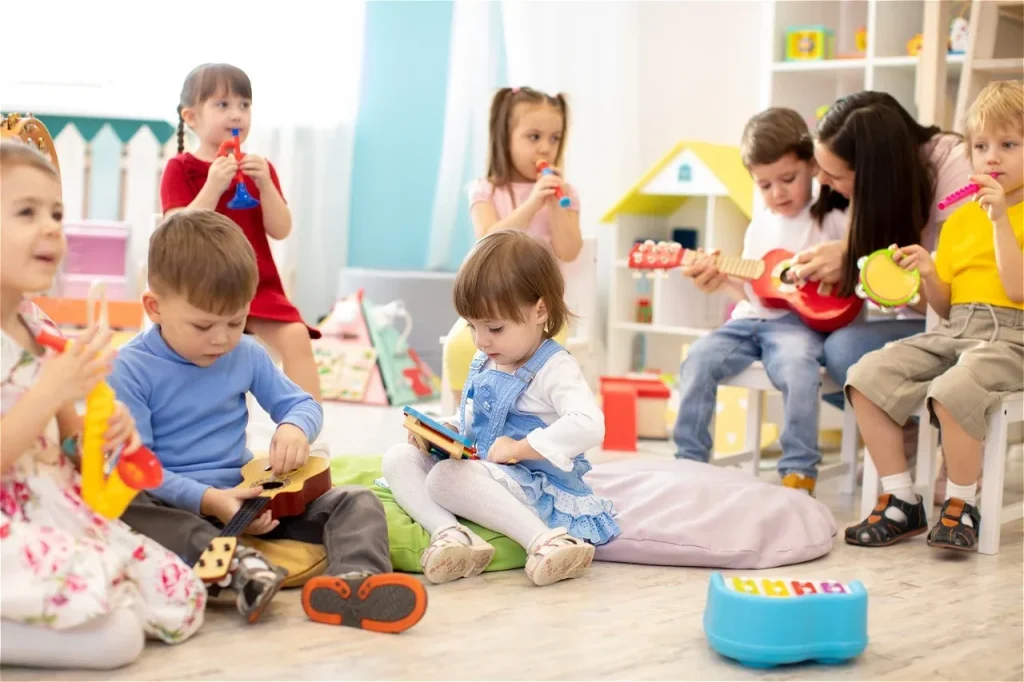
9. What Kinds of Physical Activities Are Offered?
Movement supports brain development and health. A quality child care centre provides outdoor and indoor physical play. Physical activity helps regulate sleep, improve focus, and reduce behavioral issues. Outdoor time should be offered daily and include activities like climbing, biking, sandbox play, and water activities. Centers should also have indoor spaces for dance, yoga, or movement games on days when weather limits outdoor access.
Q&A:
- Q: How much time is spent outdoors each day?
A: At DeeCyDa, children spend a minimum of 90 minutes outdoors daily, weather permitting. - Q: What types of physical activities are part of the curriculum?
A: Activities include guided movement games, obstacle courses, gardening, and free exploration of climbing structures.
10. What Do Current Families Say About Your Center?
One of the best ways to find child care that fits your family is through honest reviews. Ask for references or read testimonials from families. Consistency in praise around staff kindness, learning outcomes, and safety policies speaks volumes. Be cautious if reviews mention high staff turnover, poor communication, or safety concerns. Some centers also host open houses or community events that allow parents to meet each other and build trust before enrolling in a daycare centre.
Q&A:
- Q: Can I speak with a current parent?
A: Absolutely. We can connect you with families who have been with us for over a year. - Q: Do you have public reviews or testimonials I can view?
A: Yes. We are listed on Yelp, Google, and local parenting groups where families share their experiences.
Finding Child Care Resources in the United States
When finding child care resources, it’s important to use trusted channels such as local gov websites, official government organizations, or licensed directories. These sources help ensure you’re making safe and informed choices for your child’s care. Resources like ChildCare.gov, the National Association of Child Care Resource & Referral Agencies (NACCRRA), and local child care resource centers offer valuable guidance.
Ready to Visit a Daycare Centre That Prioritizes Your Child?
At DeeCyDa, we’re more than a daycare center—we’re a community focused on delivering quality child care, trusted communication, and preschool education. From our licensed staff to our inclusive child care programs, we provide a nurturing environment for growth.
Book a tour today and explore your child’s future in a safe, enriching environment.
🔗 Visit www.deecyda.com to learn more or schedule a consultation.


